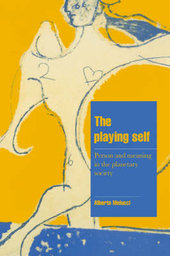
|
The Playing Self: Person and Meaning in the Planetary Society
Paperback / softback
Main Details
| Title |
The Playing Self: Person and Meaning in the Planetary Society
|
| Authors and Contributors |
By (author) Alberto Melucci
|
| Series | Cambridge Cultural Social Studies |
|---|
| Physical Properties |
| Format:Paperback / softback | | Pages:188 | | Dimensions(mm): Height 235,Width 156 |
|
| ISBN/Barcode |
9780521564823
|
| Classifications | Dewey:302 |
|---|
| Audience | | Professional & Vocational | |
|---|
| Illustrations |
Worked examples or Exercises
|
|
Publishing Details |
| Publisher |
Cambridge University Press
|
| Imprint |
Cambridge University Press
|
| Publication Date |
13 July 1996 |
| Publication Country |
United Kingdom
|
Description
The Playing Self is a groundbreaking new work from influential cultural sociologist and clinical psychologist Alberto Melucci, best known for his work on social movements and collective identities. In this book, he delves deeper into questions about the self as both a psychological and socio-cultural entity, particularly in the context of a global society for which information has become a basic resource. His phenomenological approach accounts for the self both as a site of highly subjective and intimate experiences, such as crying, laughing and loving, and in relation to social structural dynamics, through more impersonal experiences, such as the experience of time, and links of the self to politics. Melucci explores the critical search for meaning at the boundary of visible collective processes and individual day-to-day experience.
Reviews'He combines cultural and psychological analyses in a distinctive and readable manner.' The result is that every page of this original book contains quotable phrases and imaginative insights.' Michael Billig, Loughborough University 'Provides a brilliant and original phenomenological analysis of the self and its vicissitudes in 'post industrial society'. Remarkably free of jargon and deeply serious, this text is a must for anyone interested in the challenges to and new opportunities for individual freedom in an increasingly complex world.' Jean Cohen, Columbia University
|